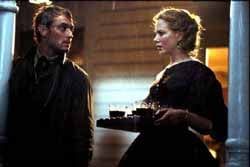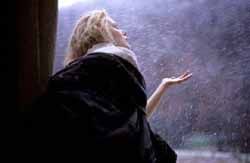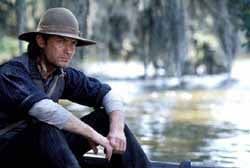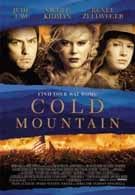Cold Mountain wants desperately to be Gone with the Wind and indeed, in many ways succeeds. Particularly in that is over-dramatized, slow, occasionally boring, and runs a lot longer than it should. Despite that, I’m actually coming down in favor of Cold Mountain, not because of the prattle coming out of people’s mouths to generate Oscar buzz, but because of the realistic way it portrays Civil War life without totally sputtering.
Yes, Cold Mountain is a Civil War drama, only without much actual war in it. Instead, as did films like Titanic or Pearl Harbor it focuses in on the love story of two people trapped in a historic event, interested more in showing us the war’s impact on the non-combatant world than putting on a showy display of mechanically re-created battles.
The movie stars Jude Law and Nicole Kidman as Inman and Ada, two star crossed lovers, who admittedly, barely know one another. Ada is the preacher’s (Donald Sutherland) daughter, who has followed her father from the big city world of Charleston to the small town life of Cold Mountain. Inman is unable to take his eyes off of her and their first meeting comes off as faintly reminiscent of Rob Reiner’s The Princess Bride, with Ada testing his interest by assigning him manual labor. However, Inman is a soft-spoken, awkward handyman and the two barely have a chance to exchange more than a passionate kiss (let alone words) before Inman is swept up in the beginnings of the Civil War, sent off to fight for the Confederacy. You have to question why they even love each other and in fact both of them do, which isn’t that great a sign for those of us stuck in the audience.
Ada’s father dies, leaving her ill-equipped for survival on a country farm, when all her slaves have run off. A sensible neighbor (in short supply) sends her a capable helper named Ruby (Renee’ Zellweger), who enters the film by popping the head off what Ada proclaims a devil rooster. Ruby quickly becomes more of a partner than an employee. With her help, they get the farm in shape so that Ada can finally crawl out of bed and stop grieving for Inman, a man who, again, she barely knows. Ruby proves a welcome relief, both for Ada and to us. Zellweger’s over acted grimace and can-do persona drip off the screen providing both comedy and heart, something this movie doesn’t have much of without her. However, the film’s ugly villain eventually rears his head, threatening their newfound prosperity as he lusts after Ada and her property for what must be simple jealousy.
Meanwhile, prompted by a letter from Ada, Inman decides to desert so he can run home to the woman he loves. This comes as somewhat of a shock, since just a few scenes earlier he displays uncommon bravery in director Anthony Minghella’s only massive action set piece. Thus does Inman trudge across the mountains of the Deep South, inexplicably shunning horses, even those dropped right in his lap. He chooses instead to slog VERY slowly through mud, rain, and cold; dodging pursuers bent on enforcing a law which demands death for deserters and those who aid them. Most of the movie is spent watching him walk, wondering if he’ll ever get home. By my count he grows at least three full beards during his journey, while I think I only grew two. Along the way he encounters colorful characters and temptation in what could be described as a slowed down, actionless version of Homer’s Iliad. Personally, I prefer the Iliad with sirens, Cyclops, and hydras.
But there are things to love about Cold Mountain and I hate to sound like I’m coming down on it hard. In fact it does give us a pretty realistic and interesting look at what every day living might have been like for southerners during the Civil War. Not just those in the middle of the battle, but the folks back home away from the fighting.
Minghella also has a great flair for beautiful scenery. The one horrific battle he shows us is filled with striking imagery, though the majority of the film is mountains and trees. Simple those may be, but Minghella imbues his landscapes with a breathtaking majesty. He also loves keeping his actors dirty, which is always a welcome change from the unrealistic Hollywood tendency to show big stars pretty and clean, even in the midst of battle or hip deep in pig manure.
Cold Mountain also sports a great cast of much smaller supporting characters. Natalie Portman plays a desperate young mother who tempts Inman with a family. This could have been nothing but a cameo, but Portman turns it into one of the film’s most penetrating sequences. Brendan Gleeson appears as Ruby’s father, leading a group of musical deserters, nearly reminiscent of O Brother Where Art Thou’s “Soggy Bottom Boys”, and accompanied by real life musician Jack White.
When all is said and done, you can’t help but admire Cold Mountain in pieces. It is only as a whole that it just doesn’t quite click. Kidman and Law are solid, if somewhat introverted and serious. The supporting players are memorable and even occasionally fun. But the movie is too long, the journey too slow, the characters too disconnected from one another to really make us care. What might have been an emotional love-fest is merely another admirable Civil War love-drama that can take its place alongside a dozen or so others and be forgotten.






Most Popular




